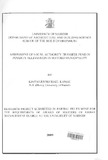| dc.description.abstract | In recent years, there have been widespread attempts both to redefine the role of the public sector
in developing countries and to improve its performance. An increasingly important component of
these reforms has been the introduction of policies to decentralize the functions of government.
As a policy, decentralization seeks to improve service delivery through paving a ‘short road to
accountability’ (Smoke, 2001) in that citizens under a centralized regime normally have to voice
their demand for better services to central authorities who in turn direct local level bureaucrats to
respond. However, if well conceived and implemented, decentralization makes it easier for
citizens to voice their demands on government, as well as better monitor the performance in
services delivery.
In Kenya the enactment of Local Authorities Transfer Fund Act (LATF) of 1998 and the
subsequent Local Authorities Transfer Act regulations of 1999, saw introduction of a fiscal
decentralization process. The process was aimed at improving services delivery to the public
through local community participation and improvement financial management, revenue
mobilization and accountability in local authorities. Designed to actively engage local citizens on
their priority needs, LATF holds strong opportunities in poverty reduction and national
development if well managed.
Taking Mavoko municipality as a case example, this research project first examines the
conceptual foundations upon which LATF is founded and implemented. It then tries to assess
how LATF as fiscal decentralization process has contributed to urban poverty reduction through
involving local communities in its planning, management and implementation. Key focus is also
given to its contribution in funding infrastructure services at the local level and in improving
accountability through the existing monitoring and evaluation systems and frameworks. The
research project concludes with key observations and recommendations on how LATF can be
improved both at national and local authority levels.
With most local authorities faced with challenges in pro poor services delivery, this thesis
provides some key insights and policy recommendations in using LATF to unlock the urban
management challenges such as access to infrastructure services and poverty reduction.
A case study approach through an in-depth analysis of LATF implementation in Mavoko was
adopted. This was found to be important in aiding the researcher connect the micro level to the
macro levels, social and administrative structures and processes in administration and
implementation of funds and how policies at the national level have impacts on local level
implementation. Secondary data collection was done through extensive literature review while
primary data was obtained through interviews. | en |

